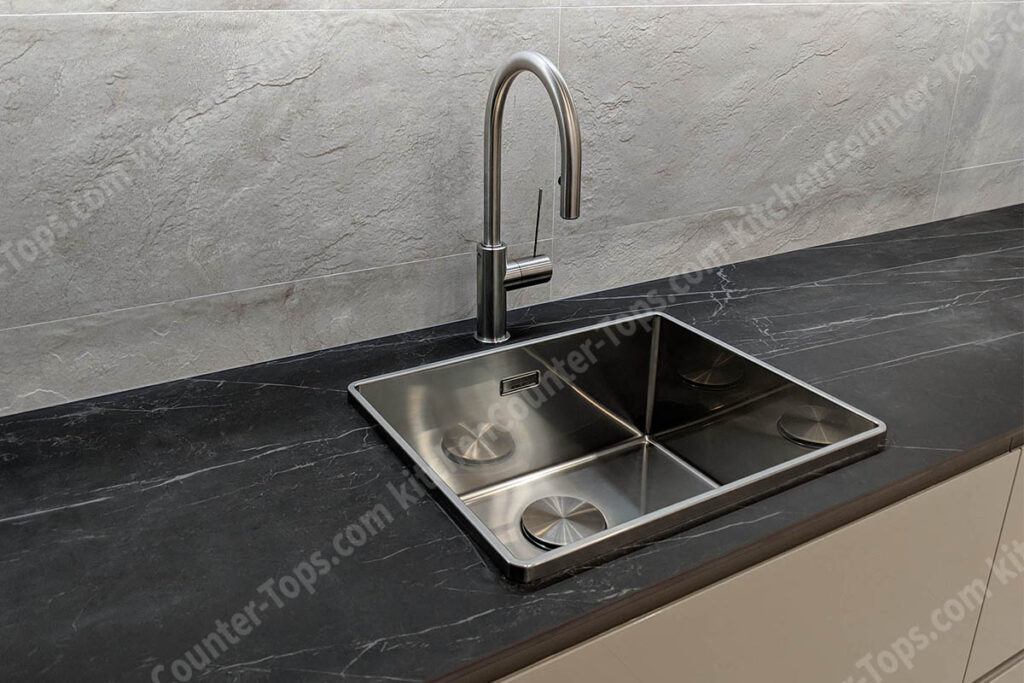Porcelain is one of the most widely used materials for designing exquisite bathroom interiors. It’s perfect for shower walls because it’s sturdy, long-lasting, and low-maintenance.
Although many people find porcelain countertops a novel concept and a material that requires some getting accustomed to, they can be more than simply a fad. Porcelain countertops are popular and in high demand in several regions, such as the US, Spain, and Europe. In this post, we will learn more about porcelain countertops so you can decide whether they are excellent enough to use at home or if they are a worthwhile investment.
Additionally, porcelain is a very adaptable material, so with a few easy adjustments, you can get nearly any style you desire. The extensive selection of huge porcelain slabs may be tailored in 50 different colors and finishes to go perfectly with your bathroom.
What is Porcelain?

A particular kind of clay rich in kaolinite is used to make porcelain. It’s also important to remember that kaolinite-rich clay contains minerals like silica, feldspar, and mineral oxides that give it potential strength and attractive colors. Porcelain is most commonly used in bathrooms, but it can also be found on worktops, wall accents, and decorative accents on other surfaces.
How Are Porcelain Countertops Made?
A ceramic product called porcelain is baked at a very high temperature to give it a glassy, vitreous appearance, such as reduced porosity and translucency. Off-white or white porcelain is typically available in both glazed and unglazed varieties. The unglazed variant is most commonly represented by bisque that has been fired at a high temperature.
Why do Porcelain Countertops look Like Marble Countertops?

Marble countertops and porcelain countertops are completely different. They were made of various materials. They’re made in a different way. Additionally, porcelain countertops have a different feel due to their thickness. But in other aspects, porcelain worktops might be identical to marble, and if you’re not a knowledgeable consumer, you won’t be able to tell the difference.
Because of their unique manufacturing technique, porcelain countertops are treated to resemble wood planks or real stone. Like marble countertops, porcelain countertops can be sophisticated, rich, and attractive. Therefore, porcelain might now be a perfect substitute for marble if you want that type of style.
The Good and bad about Porcelain Countertops

Like other materials out there, porcelain has also a good and bad side when used as your countertops in the kitchen.
The good thing about porcelain countertops is that they are available in different colors and patterns. They have large slabs sizes, with several finished available. They can be cleaned easily, no sealing is needed, can be recycled, and have heat-resistant properties. Not to mention, porcelain countertops is affordable.
On a different side, porcelain countertops can crack and chip, but it may take much force to do it. In addition, it may require a modified setting material in order to anchor it to the substrate. Aside from these two common issues, so far, there is nothing to worry about using porcelain countertops.
Porcelain Slab Shower Wall

For luxurious showers, porcelain slabs are becoming a more and more popular choice! They are superior to traditional tiles in a number of ways, such as:
The appearance is sleek and modern because fewer joints and less grout can discolor over time.
Large slabs make cleaning considerably more manageable and more efficient because there are fewer grout lines.
Waterproofing: Reducing the number of joints that let water pass through reduces the chance of leaks.
Versatility: Porcelain slabs provide a wide range of design options by mimicking the appearance of wood, stone, or other materials while maintaining the practical properties of porcelain.
Porcelain Countertops NYC

Porcelain slabs, whether classic marble or more contemporary, have a natural stone appearance and are excellent options for food contact in both home and commercial settings. These resilient surfaces add value to any kitchen countertop with their simple design and low care requirements.
These countertops are more than eye-catching. They come in a range of designs and finishes and are remarkably durable. However, like any other material, they have benefits and drawbacks.
With this advice, you may examine the benefits and drawbacks of adding a porcelain countertop to your house. Additionally, Master Tops specializes in producing and installing premium porcelain and natural stone benchtops in kitchens, bathrooms, and laundry rooms if you’ve decided to install these long-lasting countertops.
The Bottom Line
It seems that porcelain countertops are not only affordable but also long-lasting. You will undoubtedly discover the ideal solution to fit your kitchen style among the many possibilities available today.
Give us a call right now to remodel your bathroom in NYC.


